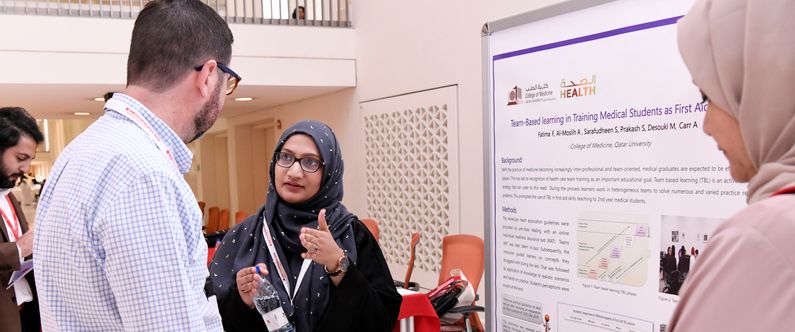Forum shines light on medical education
 The forum gave healthcare educators the chance to explore recent innovations in medical education.
The forum gave healthcare educators the chance to explore recent innovations in medical education.
Weill Cornell Medicine – Qatar’s inaugural Medical Education Research Forum was launched with two world-renowned speakers and an exhibition of faculty research posters.
Organized to provide an opportunity for those involved in teaching the next generation of doctors, nurses and healthcare workers the chance to hear about the latest techniques and innovations to come from study of medical education, the event also allowed delegates to discuss local medical education challenges and to identify current trends in the field.
Faculty from Weill Cornell Medicine – Qatar were joined by colleagues from Hamad Medical Corporation, Sidra Medicine, Qatar University and College of the North Atlantic - Qatar among others.
They were welcomed by Dr. Javaid Sheikh, dean of WCM-Q, who explained the ethos behind WCM-Q’s approach to medical education.
“We are a young medical school, but we are very nimble,” he said, “and we have good resources so we have decided to be innovative wherever we can, to think outside the box and to use technology wherever possible.”
The creation of the Innovations in Global Health Professions Education by faculty at WCM-Q has helped facilitate this. By drawing together like-minded individuals from around the world to discuss new models of international medical education, Dr. Sheikh said it helps the college to graduate health professionals who are globally informed but with the skills to address local health needs.
The forum’s keynote speaker Dr. George Thibault, Federman professor emeritus, and former president of the Josiah Macy Jr. Foundation in New York, spoke about ‘The Promises and Challenges of Interprofessional Education (IPE)’ - an area of medical education that WCM-Q has practiced for some time.
Dr. Thibault said the concept of IPE, where doctors train with nurses, paramedics, anesthetists and other healthcare professionals, dated from the 1960s, but it is only in the last decade or so that medical schools had started to put the theory into practice. This may be because of the obstacles to introducing IPE, which include curriculum content, logistics and unenthusiastic faculty members.
The conference’s second keynote speaker, Dr. Julie Youm, is director of educational technology and assistant dean of education compliance and quality at University of California School of Medicine. Her lecture, entitled ‘Technology in Medical Education’, addressed some ways in which technical innovation could be applied in the classroom.
Dr. Youm detailed how the medical school had innovated as new products came onto the market, for example holding content creation events for medical apps, curating a new ‘doctor’s bag’ filled with mobile health devices, and launching virtual reality empathy training in 2017.
There then followed a question and answer session, followed by lectures from Dr. Alla El-Awaisi of Qatar University, who discussed ‘Transforming Interprofessionalism in Qatar- Lessons Learned from the Interprofessional Education Committee Experience (2014-2018)’; Dr. Amal Khidir from WCM-Q who delivered the talk, ‘Professionalism: Developing your own modules to suit your multi-cultural context’; Sa’ad Laws from WCM-Q who spoke on the topic ‘Innovative curriculum on blended inquiry-based and collaborative learning for clerkships’; and Dr. Khalil Ullah Shibli, of Hamad Medical Corporation, who asked ‘Is there a clear and visible relationship of patient safety with ACGME six core competencies? A study of anesthesia residents’ perception.’
Dr. Thurayya Arayssi, associate dean for senior associate dean for medical education and continuing professional development, said the day had been a valuable learning experience.
“Weill Cornell Medicine – Qatar is already providing an innovative medical curriculum and offers students some of the best training available in the world,” she explained. “Our IPE training is well-established, and our Clinical Skills and Simulation Lab is probably the most technologically advanced in the Middle East. We do not want to stand still, however, and we must stay abreast of the latest trends and updates, so the inaugural Medical Education Research Forum was an opportunity for ourselves and our colleagues at other national institutions, to hear about the latest thinking in the field of medical education, discuss potential collaborations, and develop new strategies to ensure we remain at the forefront of medical education.”
The conference ended with a research poster session featuring studies conducted by medical education professionals in Qatar.
The session’s winners were:
1st Narjis Mumtaz, of Hamad Medical Corporation. ‘Retrospective analysis of anesthesia residents OSCE assessment results 2016-2018 – Does OSCE measure what it promises?’.
2nd Alla El-Awaisi, of Qatar University: ‘Exploring healthcare facilitators’ perceptions in delivering interprofessional activities in Qatar: A qualitative study.’
2nd Ruben Peralta, of Hamad Medical Corporation. ‘Introduction of a novel trauma & critical care fellowship program for clinical staff: Lessons in regional medicocultural differences.’
2nd Adam Larson, of WCM-Q. ‘The impact of learning process and curricular innovation on medical students’ choice of specialty: A mixed methods study from Qatar.’
3rd Deema Al-Sheikhly, of WCM-Q. ‘Strategies for building a CPD program in an undergraduate medical school: Lessons learned.’
